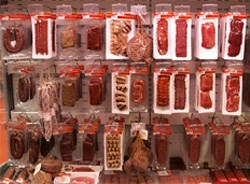Food labelling has been in the spotlight following the European horse-meat scandal and the findings of a recent study by the University of Stellenbosch where undeclared ingredients were found in a number of meat products in South Africa.

Where’s the beef? Concerns around the mislabelling of meat products span the health, economic, religious and ethical spheres, and strictly speaking, importers, manufacturers, distributors and retailers who sell mislabelled food products in South Africa are committing an offence. (Image: Wikimedia Commons)
An article released by City Press on Sunday sought to "name and shame" several major retailers who allegedly failed to fully disclose the ingredients in some of their meat products. In response to these allegations, several players in the industry have responded by stating that unavoidable cross-contamination is to blame and that the products are nonetheless fit for human consumption.
Many consumers have voiced their concerns regarding the mislabelling of meat products and its implications, which span the health, economic, religious and ethical spheres. The Congress of South African Trade Unions and the Food and Allied Workers Union have voiced their concern at the prominent retailers' apparent disdain for the rights of South African consumers.
Unlawful
Although these concerns are of course valid and deserving of consideration, manufacturers, retailers and consumers should also be aware that the sale of mislabelled foodstuffs is unlawful in South African law.
In terms of the Foodstuffs, Cosmetics and Disinfectants Act (Foodstuffs Act), it is a criminal offence to describe, for purposes of sale, any foodstuff in a manner which is false or misleading as regards the foodstuff's origin, nature, substance, composition, quality, strength, nutritive value or other properties. This includes instances where a person sells or imports (with the intention of selling) a foodstuff. In terms of the Foodstuffs Act and its regulations, subject to very limited exclusions, it is also an offence to manufacture, import, sell or offer any pre-packaged foodstuff without a complete list of ingredients, including all additives.
In addition, the Consumer Protection Act (CPA) provides that a retailer of goods must not supply any goods if the retailer knows or reasonably suspects that a trade description has been applied to the goods which is likely to mislead the consumer as to any matter implied or expressed in that trade description. Section 41 of the CPA further prohibits false, misleading or deceptive representations. In terms of the CPA it would be a false, misleading or deceptive representation to falsely state or imply, or fail to correct an apparent misapprehension on the part of a consumer to the effect, that any goods have ingredients or qualities that they do not have.
Selling mislabelled food products? You're committing an offence
A recent notice published by the Department of Trade and Industry for public comment provides for certain categories of goods which are required to have a trade description applied in terms of the CPA. Included are processed and packaged meat products as well as dried and packaged meat products. The information required in the trade description applied to these products will include the ingredients of which the goods consist as well as the quality of the goods.
Strictly speaking, importers, manufacturers, distributors and retailers who sell mislabelled food products in South Africa are committing an offence under the Foodstuffs Act and may be conducting themselves in contravention of the CPA.
So what does this mean for companies in the food supply chain?
As mentioned above, non-compliance with the Foodstuffs Act is a criminal offence. A first offence is punishable on conviction by a fine of up to R20,000 and/or imprisonment for up to six months. For multiple convictions, the maximum fine increases to R80,000 and/or two years imprisonment.
Class action
From a CPA perspective, a contravention of the relevant provisions may be regarded as being a violation of a consumer's right to fair and honest dealing. Recent reports indicate that Minister of Trade and Industry, Dr. Rob Davies, has requested the National Consumer Commission to launch an investigation into meat labelling.
Where a consumer's rights under the CPA have been infringed, consumers or a group of consumers may approach the National Consumer Commission, the National Consumer Tribunal or the court to seek any relief which may be provided for in the CPA. In principle, a group of consumers could bring a class action where their consumer rights have been violated by incorrect labelling.
Importers, manufacturers, distributors and retailers of food products should be aware of the extent of their obligations and potential liability in respect of product labelling under the applicable legislation. Consumers should also be aware of their right to fair and honest dealing and to truthful information about the foods they buy and consume.








































